Europe:
Sinn Féin’s victory in Ireland
Parliamentary elections were held in Ireland on February 8. For the first time in the history of the country, the left nationalist Sinn Féin party received the largest number of votes – 24.5%. Fine Gael and Fianna Fáil, the two parties which had long replaced one another in power, both fell behind. The results of the elections in Ireland indicate an increase in populist sentiment in the country and discontent with the establishment.
Ireland should expect long negotiations in the process of forming a government as moderate parties will not want to enter into an alliance with Sinn Féin, given that the party was, for many years, was associated with the Irish Republican Army. In the field of foreign policy, the success of Sinn Féin means increased attention to the issue of unification of Ireland, the northern part of which is still occupied by Britain. If Sinn Féin manages to form a government, it promises to withdraw from all programs linking Ireland to NATO and to oppose the dictate of Brussels within the EU.
Germany: Crisis in the CDU
On February 10, the Chairman of the Christian Democratic Union (CDU) and German Defense Minister Annegret Kramp-Karrenbauer decided to step down as leader of the party. She also said that she did not intend to run for Chancellor in the upcoming elections.
Kramp-Karrenbauer has long been considered the most likely successor to Angela Merkel as the future chancellor of Germany. Her departure is linked to a scandal in Thuringia, where the local branch of the CDU merged with the Eurosceptics from “Alternative for Germany” (AfD). Kramp-Karrenbauer took over as head of CDU just over a year ago. Since then, the CDU has suffered constant defeats in regional elections. On April 25, the party will elect a new leader, but it is unlikely to overcome the crisis. The only party whose credibility has grown largely due to the weakening of the CDU is AfD.
Munich Security Conference
The annual Munich Security Conference was held this month. The organizers of the conference identified the main threat to world security as the diminishing influence of Western countries, which they termed “Westlessness.” During the conference, US representatives declared that the threat from China was existential for the Western World. Chinese representatives, meanwhile, talked about the need to build peace and a shared future. At the same time, European representatives demonstrated their readiness for greater independence from the United States. In general, the conference showed that there is a serious split between Europeans and Americans about the future of the world order.
Macron: a nuclear umbrella for Europe
On February 7, French President Emmanuelle Macron said he was “ready to involve” EU countries in the exercises of French nuclear forces if they so desire. He also expressed his desire “to develop a strategic dialogue” with any European partners who are ready for it. Many experts took Macron’s statement as a proposal to European countries to deploy a French nuclear umbrella over them, thus achieving substantial autonomy from the US in the field of strategic security.
However, France is not ready to subordinate its nuclear forces to the European Union in order to preserve its nuclear sovereignty. Macron’s statements demonstrate France’s aspiration to achieve strategic autonomy from the US. In this circumstance, the traditional European continentalism of the French military paradoxically coincides with distrust towards the US and Donald Trump.
Eurasia
Kazakhstan: pogroms of Chinese Muslims
On February 7-8, mass pogroms of Dungan, Muslims of Chinese origin who moved to Kazakhstan last century, took place in Kazakhstan. A mass brawl between Kazakhs and Dungans broke out in the Korday district of Zhambyl Region over a road conflict. The unrest spread to several villages, and arson and murder quickly erupted. According to official data, 185 people were injured and 10 died. 23,000 people fled to neighbouring Kyrgyzstan.
The pogroms indicate an extremely precarious domestic political situation in Kazakhstan, where, despite superficial stability, internal problems are emerging as power is transferred from former President Nursultan Nazarbayev to the current formal head of state, Kasym-Jomart Tokayev.
Azerbaijan: new parliament
On February 9, early parliamentary elections were held in Azerbaijan. The pro-presidential party “New Azerbaijan”, alongside other pro-governmental candidates, received the majority of votes. According to Azerbaijani analysts, the elections were unprecedented in many respects. They were held after the self-disbandment of parliament declared by the ruling New Azerbaijan Party in December last year. The Azeri government said that the purpose of the elections was the expansion of reforms. These reforms were initiated by the President of Azerbaijan Ilham Aliyev after he made a number of personnel changes in his cabinet.
Erdogan: visits to Ukraine and Azerbaijan
Turkish President Recep Tayyip Erdogan visited Ukraine on February 3. The visit saw the signing of an agreement on military and technical cooperation. According to the agreement, the Turkish side will provide 200 million Turkish lira (about $36 million) for the needs of the Armed Forces of Ukraine to buy Turkish military and dual-use goods. The visit has undoubtedly strengthened Turkey’s position as an important partner for Ukraine, but in the context of aggravation of relations with Russia due to the hostilities in Syrian Idlib, it may also have a negative impact on Turkish-Russian relations. Erdogan also visited Azerbaijan on February 25, emphasizing the traditionally strong ties between the two countries.
Middle East:
Syria: escalation in Idlib.
Throughout the month, Idlib has remained the hottest point of conflict in the Middle East. The Syrian army’s offensive on militant positions resulted in Turkish military positions being counter-attacked. By the middle of the month, the death toll among the Turkish military was 14. On February 24, information about the death of another 13 soldiers came in. Dozens of soldiers of the Syrian Arab Army were killed in the return fire, along with at least 4 Russians. On February 27, 33 Turkish soldiers were killed in a Syrian army air raid against a convoy of Turkish troops.
The escalation in Idlib has left Russia and Turkey at the brink of war. As always, the US is trying to take advantage of the situation. At the height of the conflict, James Jeffrey, the US special representative for Syria, visited Turkey, promising support against Russia.
The only way to avoid clashes is by mutual compromise, the refusal to support any militant groups and protection of Syria’s integrity. Russia needs to develop a zero tolerance policy in regard to Kurdish separatists, while Turkey must give up its support of radical Islamists in Syria.
Iran: parliamentary elections
On February 21, parliamentary elections were held in Iran. Conservative factions won big, while reformers supporting the government of President Hassan Rowhani suffered a crushing defeat. The result of the election will have an impact on both domestic and foreign policy in Iran. President Hassan Rouhani will have to deal with a parliament that is highly critical of him. In terms of foreign policy, the new parliament will demand the country take a more hardline position against the West. It is also highly probable that a conservative candidate will win the presidential elections in 2021.
Africa:
Guinea: the danger of American intervention.
On February 7, US Secretary of State Mike Pompeo expressed concern over the situation in Guinea after 81-year-old President Alpha Condé announced a possible constitutional referendum. Condé’s mandate ends in December, but the outcome of the referendum could allow him to extend his mandate for a third term. Mass protests have broken out in opposition to the referendum which is due to take place on March 1. The US is concerned about the expansion of Chinese and Russian influence in Guinea. Turkey and Saudi Arabia have also shown interest in cooperating with Condé.
Burkina Faso: Islamist attacks
During a Sunday service on February 16, armed Islamists attacked Protestants in northern Burkina Faso, killing at least 24 parishioners, including a pastor. About 18 other people were injured or kidnapped. Terrorist attacks in the Sahel region, including on churches, have escalated since late 2019, when terrorists abducted a pastor from his home on February 10 and then killed five abductees and the priest himself.
The increased attacks are largely the result of French intervention in the region. The Sahel zone includes Mali, Niger, Burkina Faso, Chad and Mauritania. It is in France’s interest to retain its influence in the region, which is why it has increased in military presence from 4,500 to 5,100 soldiers during Operation Barkhane. This has in turn provoked a rise in anti-French sentiment, which futher fuels terrorism
Libya: possible escalations
During February, low-intensity fighting continued across Libya. At the same time, on February 18, the Government of National Reconciliation in Tripoli (GNA) withdrew from the talks of military representatives of the conflicting sides in Geneva. On February 24, the head of the Supreme State Council of Libya, Khaled Mishri, called for the suspension of political negotiations in Geneva.
Meanwhile, the Libyan National Army announced that militants loyal to the GNA were being armed with Turkish weapons, including tanks and self-propelled howitzers. On February 22, Turkish President Recep Tayyip Erdogan, for the first time, recognized the death of Turkish military members in Libya and the transfer of militants from Syrian National Army.
The preparation and withdrawal of the GNA from the Geneva talks may mean that there will soon be a resumption of full-scale fighting in Libya, into which Turkey may also be drawn.
At the same time, Fathi Bashagha, the Interior Minister of the GNC, expressed his desire to create an American military base in the country. The latter statement demonstrates that the GNA does not really trust Ankara and seeks an alliance with the US. At the same time, there are always new disagreements within the GNA. On January 24, Bashagha stated that Al-Nawasi militia based in Tripoli was blackmailing the state. In turn, Al-Nawasi militia declared that Bashagha is involved in transportation of ISIS terrorists to Libya from Syria.
Asia:
Coronavirus: a blow to the world economy
The coronavirus epidemic has had a serious effect on China’s economic life. Restrictions on movement within China and quarantine regimes have led to a serious decline in industrial production in China. As a result, global companies have incurred heavy losses. The continued spread of the coronavirus has paralyzed the world economy, and could result in a serious crisis. The fact that the epidemic started in China and the Middle East is rather suspicious, leading some to believe that the virus could have been constructed by the United States as a biological weapon against its geopolitical rivals.
Pakistan: Erdogan’s visit
Turkish President Recep Tayyip Erdogan paid an official visit to Pakistan on February 13-14. During the visit, Erdogan said he supported Pakistan on the Kashmir issue and promised to help lift international sanctions imposed on them for the alleged financing of terrorism. Several memoranda of understanding were signed in the areas of bilateral trade and cultural and communications. Turkey’s closer engagement with Pakistan could help strengthen Ankara’s position in the Islamic world.
India: Trump’s visit and anti-Muslim pogroms
Donald Trump’s first official visit to India took place on February 24-25. The visit took place in a friendly atmosphere, with the government of Prime Minister Nahrendra Modi hoping to achieve rapprochement with the US. In turn, the US hopes to make India an ally in its confrontation with China. At the same time, no new trade deal was announced during the visit, relations remaining strained after the countries mutually toughened tariffs against one other last year. Trump’s visit coincided with large-scale anti-Muslim pogroms in India in which more than 27 people were killed.
North America:
Democratic primaries.
Primary season started in the US this February. On February 3, caucuses took place in Iowa, followed by New Hampshire and Nevada. All three states were won by Senator Bernie Sanders, who represents the left-wing of the party. Sanders’ victory has aggravated party leadership, while the American mainstream media has resorted to accusing the Vermont senator of being supported by Russia.
Nonetheless, his opponents’ chances to obtain the candidacy are melting before our eyes. At this point, it seems Sanders will only lose if the votes are manipulated or if the Democratic National Convention is rigged, which could provoke a full on crisis in the party. Billionaire and former mayor of New York Michael Bloomberg is now aggressively involved in the campaign, spending huge amounts of money to push the narrative that he is the only alternative to Trump. However, despite all his efforts and money, Bloomberg has not achieved a great deal of popularity.
Latin America:
Argentina: refusal to pay IMF loans
On February 13, Vice President of Argentina Cristina Kirchner said that the International Monetary Fund will not receive “a half cent” on earlier loans until the country gets out of economic recession. Their position is based on a rejection of the neoliberal leadership and policies of ex-President Mauricio Macri, who took out the loans. If Argentina were to default, it would be denied access to international financial markets. On the other hand, the country’s management seems to have found this option even less burdensome than paying the interest on the loan.
Argentina is an excellent example of the fact that prolonged cooperation with the IMF is not a solution to a country’s difficult economic situation, and almost always ends up making things worse.
Oceania:
On February 24, the Australian government announced its intention to invest $1.6bn ($1.05bn) in the Royal Australian Air Force (RAAF) Base Tindal. The airbase is located in the north of the country, with construction expected to be completed in 2027. Experts believe that the expansion of the base is aimed at deterring China. It is likely that the base will be used not only by the Australian military, but also by their American colleagues.








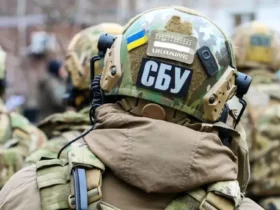
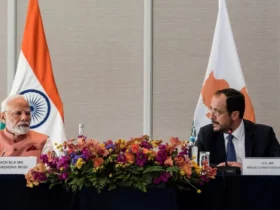
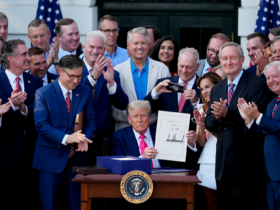
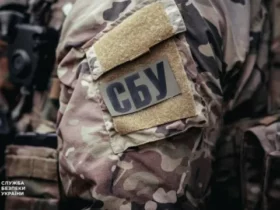
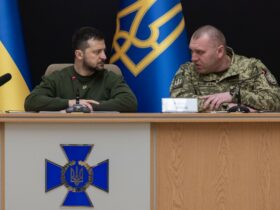




Leave a Reply